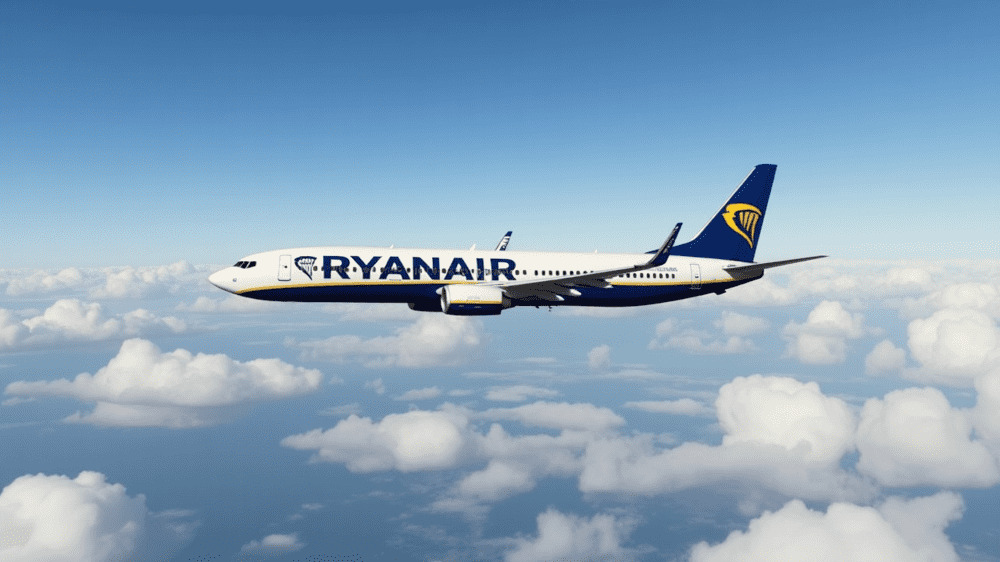Home » AIRLINE NEWS » Ryanair issues Spain travel threat and tells passengers it’s ‘significant’
Sunday, July 13, 2025
Ryanair has made a blunt threat that it might considerably cut its flights to Spain, after an escalation of its long-standing row with AENA, the airport operator of Spain. The disagreement is based on the announced airport fee increases of AENA, which, according to Ryanair, will increase its costs substantially. This escalating disagreement may have serious implications on the aviation market of Spain, as the airline is among its largest operators at its core airports. If the increases in fees take effect, the airline might be compelled to downsize its routes to the nation, resulting in fewer choices available to travelers and, possibly, higher expenses. This row is now at the deciding moment for both Spain’s aviation market and Ryanair.
Ryanair has sounded a firm warning that it might slash its operations to Spain amid deteriorating relations between the airline and the airport operator, AENA, in Spain. The budget carrier, which has competition from others like EasyJet, TUI, and Jet2, is mulling decreasing its flight services to Spain’s airports, especially during the coming winter months.
The airline’s CEO, Michael O’Leary, has criticized the situation, indicating that if the conflict is not settled, the airline will have to scale down even more.
The Issue at Hand: AENA’s Proposed Fee Increase
The main point of contention revolves around AENA’s plan to increase airport fees by 6.5% for 2026. This increase is part of a broader strategy to adjust to the rising operational costs that have impacted Spain’s airports. AENA had already implemented a 4.09% fee increase in 2024 to offset the rising energy costs, largely due to the geopolitical tensions surrounding the war in Ukraine.
AENA argues that these fee hikes are necessary to maintain the financial health of Spain’s airports and support the growing demand for air travel. However, Ryanair and other low-cost carriers contend that these increases will make it difficult to keep fares low and could lead to a reduction in affordable travel options for passengers.
AENA’s Defense and Legal Justification
In response to Ryanair’s criticism, AENA has defended its decision to raise fees, asserting that the increase is both legal and essential for the continued operation of Spain’s airports. AENA’s president has dismissed the idea that airlines are pressuring the airport operator, stating that fare adjustments are made based on clear financial needs and are fully compliant with regulations.
Passenger traffic is predicted to hit 320 million in 2025, and for that, the aviation sector is likely to need more investment in infrastructure, the fee hike being contemplated is likely to provide about €218 million, which, it is claimed, will help cover the expanding requirements of the aviation market in Spain.
Ryanair’s Stance: Service Cuts May Result Due to Rising Costs
Ryanair has made it clear that any increase in operating costs due to higher airport fees would strain its low-cost model. The airline has warned that it may be forced to cut routes to Spain, which would particularly affect travelers looking for affordable flights to popular destinations. Ryanair’s focus on providing budget-friendly travel means that any additional costs could result in fewer flight options, especially for consumers who rely on the airline’s services for low-cost travel across Europe. Ryanair’s potential reductions in service could seriously impact the tourism industry of Spain, as well, since the airline is its most significant source of European city flights.
Far-reaching Impacts on the Aviation Sector of Spain
The conflict between Ryanair and AENA highlights the broader challenges facing Spain’s aviation industry. While Spain continues to attract millions of international travelers, rising operational costs could hinder the growth of the low-cost airline sector. If Ryanair and other budget carriers are forced to reduce services or raise fares, the impact on Spain’s air travel market could be substantial.
Rivals such as Jet2, TUI, and EasyJet will most likely experience the same issue with conforming to the increases in fees, although its vast footprint in Spain renders Ryanair the loudest stakeholder in this conflict. Cuts on behalf of Ryanair may lessen competition along major itineraries, which may result in fewer choices and the price increase that travelers pay.
The Future of Spain’s Aviation Travel Market
Towards the future, the proposed increases in fees that have been announced by AENA may have future implications on the aviation sector in Spain. If other carriers take the same route and scale down their operations because of the increase in costs, the market may experience fewer cheap alternatives for travelers. The popularity of Spain as an European traveling destination may also be compromised if carriers take down their operations because of increased costs of operation.
With the increase in the number of passengers, it is essential that Spain’s airports strike the right balance between their economic requirements and the interests of the airlines, especially the budget carriers that offer cheap journeys to millions of travelers. The final solution to this dilemma will have long-term implications both for the airlines and the travelers.
Conclusion: An Inflection Point for Spain’s Aerospace Sector The current conflict between Ryanair and AENA is the bellwether of Spain’s aviation scene. Threats of service reductions looming and increased costs of doing business, the air carrier business in Spain may undergo radical transformations. The outcome of the conflict will spell the future of cheap air travel to Spain, affecting both the passengers, the carriers, and the entire tourist sector at large. Whether the threat is implemented or the parties agree to compromise, the future of air travel in Spain will be determined post this conflict, and that will be for several years to come.
